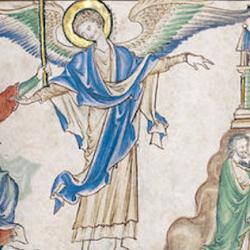Jesus threatens to come to the church at Sardis “like a thief” (Revelation 3:3), and later warns the unprepared in Babylon that He is coming liek a thief (16:15). The latter passage indicates what Jesus is coming for: “Blessed is he who stays awake and keeps his garments, lest he walk about naked and men see his shame.”
Several things click into place. First, the re-use of the image of the thief (these are the only two uses in Revelation) suggests a structural connection. Austen Farrer, James Jordan, and others have noted that the letters anticipate later portions of Revelation, and the letter to Sardis generally anticipates the post-bowl section, with its mention of white garments (3:4-5; 19:14). Yet, the thief image suggests that the Sardis letter links also to the latter part of the bowl section.
This suggests, second, that the nearly dead church at Sardis is linked to the fall of Babylon.
Unprepared and drowsy, the church at Sardis will be surprised by the fall of Babylon. And this, third, suggests that the background of the letter to Sardis is exilic. The notion that Jesus makes a surprise visit like a thief is itself an exilic motif; just as the conquest of Jerusalem and exile shocked the Jews who were trusting in the temple to save them, so Jesus’ advent as Judge will surprise. And the image of a thief stealing clothing reinforces the exilic motif: When Babylon came to Jerusalem, it stripped Jews of their clothes and led them naked and shaved into slavery. Jesus does the same with the citizens of Babylon, and church members associated with Babylon, who have not repented and prepared for His coming.
It is likely, too, that both the letter to Sardis and the prophecy about Babylon’s fall are drawing on the history of the fall of literal Babylon as well as on the history of the fall of Jerusalem to Babylon. If any city was taken by someone coming like a thief, it was Babylon conquered by Cyrus in a nighttime surprise attack (cf. Daniel 5). The unprepared at Sardis are like Belshazzar feasting while Cyrus sneaks to the city (see the account of Cyrus’s conquest in Herodotus). Those who fall asleep in Babylon will lose their (royal) garments and be exposed to shame. If this is true, then Jesus’ conquest of Babylon is a liberation for the true Jews who dwell in the harlot city. “Come out, come out” (18:4) is Jesus’ version of the decree of Cyrus.










